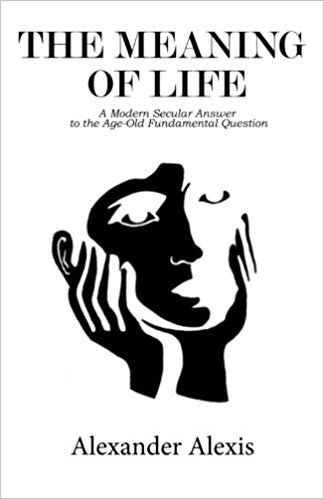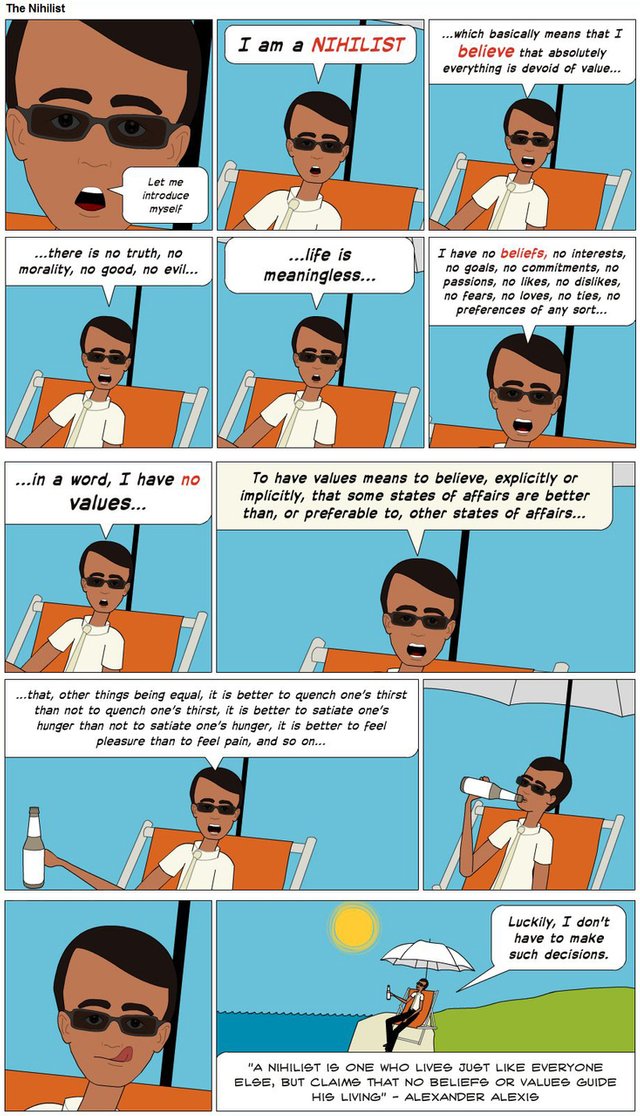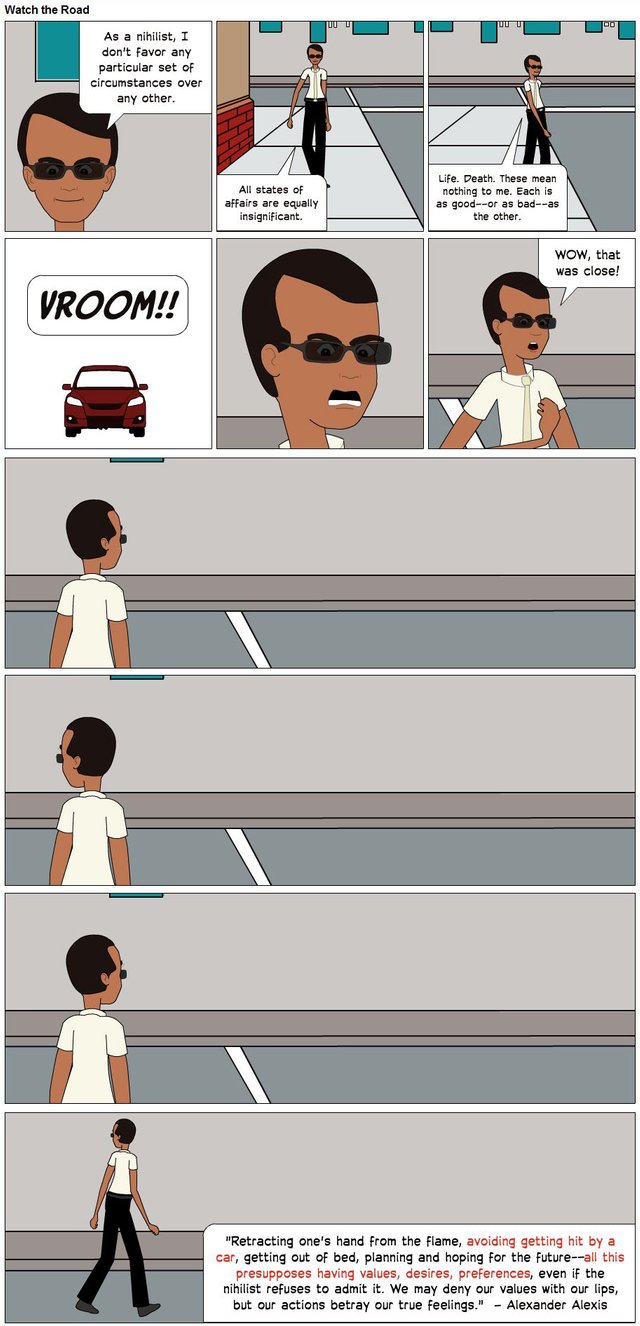I wasn’t searching for the meaning of life when I found it. It started, as so many things do with me, as an idea, quickly exteriorized in the form of a diary entry.
It was a theory about why people get depressed, and, like a secondary character in a novel who begins to demand ever greater attention from its author, and ultimately succeeds in taking over the stage, within a couple years this idea grew to encompass and explain the whole of life.
At age 25, I had the most comprehensive theory about the meaning of life that any human had ever devised. That was, in no small part, due to the fact that there had never been any real theories about the meaning of life! Yes, the question “What is the meaning of life?” might seem like a familiar and popular one, and so surely there must've been people who had attempted to answer it in the past? Well, unlike much more tractable questions—child's-play issues like whether God exists, or whether we have free will—all the books that have ever been written about the meaning of life can fill one shelf of one very small bookcase. And most of them, when you've read them, will leave you wondering whether they have said anything at all about the question at hand. It’s often a bait-and-switch, books proffering to be about the meaning of life ending up being guides to happiness, stories about survival in concentration camps (I’m looking at you, Frankl!), or essays about ethics.
My book is no such thing.
"Fewer books have been written on the meaning of life than on any other philosophical topic."* - MOL p. 16
* This statement is meant to reversely mirror the oft-heard claim that more books have been written on free will than on any other philosophical topic. Oft-heard, but I’ve no idea who said it. Or whether it’s true.

I self-published it in 2011, left it unpromoted because I’m not good at that sort of thing, and then moved on to other things. It’s really just a self-curated compilation of my most important diary entries on the subject of the meaning of life. Hopefully, it will find some new life here on steemit, where I will try to explain its main insights in a simpler language, and hopefully with pictures.
So, let us begin!
Is it possible to be a nihilist?

Before embarking on our journey toward positive theories about the meaning of life, we have to dispatch the enemy at the front gate—the person who outright denies there is any meaning in life—the nihilist. The way I approach this task is to claim that no such person can actually exist. Yes: despite what you’ve heard, there are no nihilists!
"Here is a quick definition of nihilism: Nihilism is the noun-equivalent of a negation, such as “anti-.” Thus moral nihilism for example is the belief that morality does not really exist, that it is not an objective feature of the world, that it is pure invention. One can be a nihilist about anything. If a person thinks life is meaningless, then this person is a nihilist regarding life’s meaning. One can also be a nihilist about everything at once. This kind of person would believe that absolutely everything is devoid of value." - MOL p. 24
In the book’s first chapter, I mostly try to prove A:
A: It is impossible for a sentient being to lack values.
To me, this sentence is synonymous with B:
B: It is impossible for a sentient being to be a nihilist.
Proving A therefore establishes B. Whether I am right in taking this approach to defeating nihilism is something the educated reader will have to decide for himself.
Most of the arguments in the section of the book that shares the same title as this article, can be more or less grouped under the following headings:
- Actions betray [I use “betray” here in the sense of “unintentionally reveal”] values. A being cannot act unless it has values, because in order to act a being must make choices, and these choices must be guided by preferences—preferences being another word for values.
- Decisions betray values. Without preferences to guide its decision, a being would be unable to make a decision.
- Life betrays values. A being cannot live unless it has values, because in order to live a being must eat, drink, breathe, etc., and a being who has no values will not value eating, drinking, and breathing, and will therefore lack any reason to do these things.
- Desire betrays values. Without desire there can be no motivation to do anything. Desire is a species of value.
- Judgment betrays values. The judgment “roses are more beautiful than mushrooms” means there is something in a rose that you value more than whatever there is in a mushroom.
- Perception betrays values. A lion will view a beautiful human female as a potential meal, whereas a male human will view her as a potential mate. The lion values the female only as a potential meal, and this determines its perception of her. In general, an object cannot be perceived unless it is perceived as possessing some value. And when I say “value,” I include negative valuations. In this sense, a tiger is “valuable” because it is dangerous, and water is just as valuable because it is thirst-quenching.
- Thinking betrays values. In order for an object to feature in our thoughts, we must conceive it as something that is of some value or disvalue to us. We cannot conceive of objects that are of no value to us.
- Fear betrays values. For example, we fear pain because we value its absence. A person who values nothing will fear nothing.

- Hope betrays values. Hoping for X means that X is a valued state of affairs.
- Emotion betrays values. A person who is capable of being moved by, say, a painting, is a person who values art.
All the above can be summed up in the statement “sentience [or consciousness] presupposes values.”
The book goes on about each of these numbered points in more detail, but I believe the educated reader will have gotten the gist by now, so that this article can safely be drawn to a close.
In Part 2 of this series I will briefly touch on the question of whether death makes life meaningless.
For now, I leave you with this question: Should we take nihilism seriously? What do you think? Reply in the comment section below.

I think nihilism must be true, but used as a platform.
Nihilism must first be discovered, and used as a foundation to build upon.
I do not think there is an objective purpose in life, but I think you must find a subjective objective instead.
The nihilist in the comic above? He can comprehend that we are just evolved beings, collections of self-replicating chemicals, living upon a piece of rock orbiting a star. But there are nearly infinite stars in the universe.
There is no value here. Not to the substrate of the universe.
But the nihilist will realize that he will jump out of the way of the car. His life has value to his own life. The nihilist will seek to better his life.
He wants to be happy. The nihilist will seek to find love. He wants another person happy. The nihilist will seek to enrich his community. He wants the world happy.
The nihilist is the most wise person, but only if he builds upon nihilism with his own hands. A nihilist who does not build upon nihilism will be depressed, thus, it is the quest for the mere mortal to build a throne, a throne-room, a castle, and a kingdom around him or herself, to create value.
Not objective value, for the universe will carelessly throw asteroids, earthquakes, tornadoes, and whatever else into the kingdom.
But subjective value, and to create a purpose, a subjective purpose, and to find meaning. But only a subjective meaning. It is subjective to the nihilist.
That fact that it's subjective doesn't make it lesser to something objective.
Rather, because it's subjective, it is far more precious, because it's unique to the mind of the nihilist.
The meaning of the nihilist's own life, values, and purpose, are precious to the nihilist, for completely subjective, personal reasons.
Downvoting a post can decrease pending rewards and make it less visible. Common reasons:
Submit
I never said Nihilism isn't true (unless I did, but then it was a mistake). I said no one can be a nihilist. I.e. even if nihilism is true, you can never comprehend such a truth. You could maybe enter all the information we have into a computer and program it to decide the question, and then the screen will blink and the result will be "yeah nihilism is so true you wouldn't believe", and then you'd blink, and say "well then I guess it's true", but you'd still be unable to comprehend this. Cos no living conscious organism can exist without values. Nirvana, as the Buddhists define it, would be a true state of nihilism, but it's unattainable in my view. Unless by Nirvana they just mean "dead", in which case okay.
As for the rest, I don't see how the nihilist can find value in all those things if objectively there is no value in them. You can't just throw "subjective" in there and declare the problem solved: either there is meaning and value in the things he does, or there isn't. If there isn't, why is he doing them? These French flaneur types who sit in bistros sipping cafe au laits declaring the truth of nihilism but living just like everyone else are hypocrites. I wanna see their words become action (hint: noose).
Downvoting a post can decrease pending rewards and make it less visible. Common reasons:
Submit
Why would death represent nihilism?
Downvoting a post can decrease pending rewards and make it less visible. Common reasons:
Submit
Only dead things can lack values.
Downvoting a post can decrease pending rewards and make it less visible. Common reasons:
Submit
Life itself is an illusion.
We are just chemicals replicating. There is no life.
We exist as fire exists, only far more complex and focused. The illusion is easy to fall for, but the truth here is now revealed.
Evolution has forged us into complex creatures, but at the core, we are chemical-physical in origin, and life is only a useful word to categorize genetic code and beings produced by genetic code vs less ordered chemicals.
Downvoting a post can decrease pending rewards and make it less visible. Common reasons:
Submit
I am not as deep a thinker as all of you. I enjoy reading philosophy and even arguing about ethics, in a lighter vein (even when I'm feeling serious about the argument), but I also love to play with ideas and thoughts. An example, taken (borrowing) from your article:
The judgment “roses are more beautiful than mushrooms” means there is something in an aspect of a rose that you value more than whatever there is in the same aspect of a mushroom. After all, mushrooms can be very beautiful
Quote: A being cannot live unless it has values, because in order to live a being must eat, drink, breathe, etc., and a being who has no values will not value eating, drinking, and breathing, and will therefore lack any reason to do these things.
I felt that I could short-circuit this para by using the word 'think' and the lack of thinking, but then I found that writing out this para of yours in a way that still makes sense is too complex. This thought is not the same as #7, where an attempt is made to create 'thought' without it having a value. I guess this is why I never became a philosopher, I argue myself in spinning circles like a playful kitten, until I get dizzy and fall over. I prefer situations (give value to) where movement takes me somewhere, ending up where I started is not attractive (without value...well, not much value, it is better that not arriving anywhere).
10 ...is a person who values art. (Or else, values the monetary value such a painting has, even if he does not understand/value the painting himself).
I hope my comment was not too silly ( lol, be careful, if you answer, no, it might give value to my continuing in this vein in your next posts).
Downvoting a post can decrease pending rewards and make it less visible. Common reasons:
Submit
Time to reply to this one now! Sorry for the delay.
Very nice!
You can use a pointy bracket pointing to the right ("greater than"), followed by a space, followed by the quote, to make that very cool thing I did right there! :P
I'm so stupid I don't remember what those brackets are called!
Pls do! We all enjoy it when our work is read and thoughtfully commented on. My ideas will make more sense as you read on.
Downvoting a post can decrease pending rewards and make it less visible. Common reasons:
Submit
Placing a comment here, at a post made months ago, hopefully means I will not interfere by discussing something slightly personal - not in line with the topic.
Last year I had reasons to feel positive about a business deal going through. It would be taking care of all my needs and I could then help family here and in Greece, with income left over. Being elderly, my needs are few.
At this time I came up with an idea I loved (those are the worst ideas, because it is difficult to be objective about them - and I usually end up making a fool of myself).
I had downloaded some university course on philosophy (ancient Greek) and was surprised to find that what I could not understand when I was young, made more sense to me now. As I've mentioned, I think I mostly enjoyed following the intricate threads of arguments which at the start did not look reasonable.
Because of me writing about Cherine, I had to deal with Samantha, who loves sitting amongst alien scientists and coming up with crazy ideas which they are too polite to ridicule. When their younger members examine and experiment with her ideas, most of the times they find she has opened them to new ideas that boost their growth of knowledge and scintific abilities. It reaches the point where, if she should claim the moon is made of cheese, they will first examine the moon before telling her she is wrong.
Having to deal with alien species, who have their own ways of seeing life, through their own aspects of philosophy and ethics, some of which I would enjoy copying and pasting for you to read and comment on - but, to stay on topic. Samantha and Robert, often moan about the fact that schools no longer teach ethics or philosophy. Also, what they do teach is tailored to serve the interests of the globalists and their de-population agenda. An easy example? To destroy the family unit, as it strengthens us, they pose this question and answer:
What was argued in the books by Sam, I started to consider with regard to our reality and decided to create a new business.
It would be a coffee shop, with healthy but cheap meals for the young (down to eight years old at certain hours). It would be connected to branches in Athens, London, USA, Japan and we see where else, later on. They are connected through the web cameras and philosophy and ethics are argued by the young. Older people, such a teachers or philosophers, may guide, but must not lead. The young must learn from us, but we too may learn new ways of thinking if we are open to new ideas.
Business went kaput, so I've given up the idea. Maybe a chat site for young people to discuss these subjects would work? I don't know. Does the idea make sense to you?
Downvoting a post can decrease pending rewards and make it less visible. Common reasons:
Submit
Frankly, I'll be honest, the idea does not make much sense to me, considering how the world is! I just don't see any way it would work. Also, even though your intentions are good, this still feels like preaching: the kids might prefer playing pokemon on their smartphone rather than debating philosophy.
I had the passion for philosophy from a young age, and I witnessed how people around me cared for anything but. I tried discussing it with whoever would listen. That's just not how the world is. People care about money, women (or men), cars, fun, etc. Few care about intellectual affairs.
There's lots of chatrooms and people will coalesce according to each person's interest. Some will play video games all day and talk in forums about that, and others will debate philosophy like I did before social sites even existed, via yahoo groups, basically via email!
I think today the way to get people interested in matters of knowledge is through the media. Shows like Family Guy or Southpark, though camouflaged as irreverent and sometimes stupid, are in fact very intelligent and filled with let's say "agendas": they are basically liberal and atheist and pro-science etc. Think also of Bill Maher and Ricky Gervais and others. What they all have in common is that they are educated, and they try to impart truths via the medium of, well, the media! This is the future, I think. More philosophers should try and become like Carl Sagan, rather than lock themselves in their Ivory Towers and preach to the choir.
Downvoting a post can decrease pending rewards and make it less visible. Common reasons:
Submit
Anything is possible!
Downvoting a post can decrease pending rewards and make it less visible. Common reasons:
Submit
How 'bout 1 + 1 = 2.5 ? :P
Downvoting a post can decrease pending rewards and make it less visible. Common reasons:
Submit
No problem) Let us imagine a mathematical space where x+x = 2.5
Downvoting a post can decrease pending rewards and make it less visible. Common reasons:
Submit
Well of course anything is possible in a possible (imagined) world. But not in this one.
How about the law of non-contradiction, can that be broken? I.e. can A not equal A?
Downvoting a post can decrease pending rewards and make it less visible. Common reasons:
Submit
Yes, in a recursive world.
Downvoting a post can decrease pending rewards and make it less visible. Common reasons:
Submit